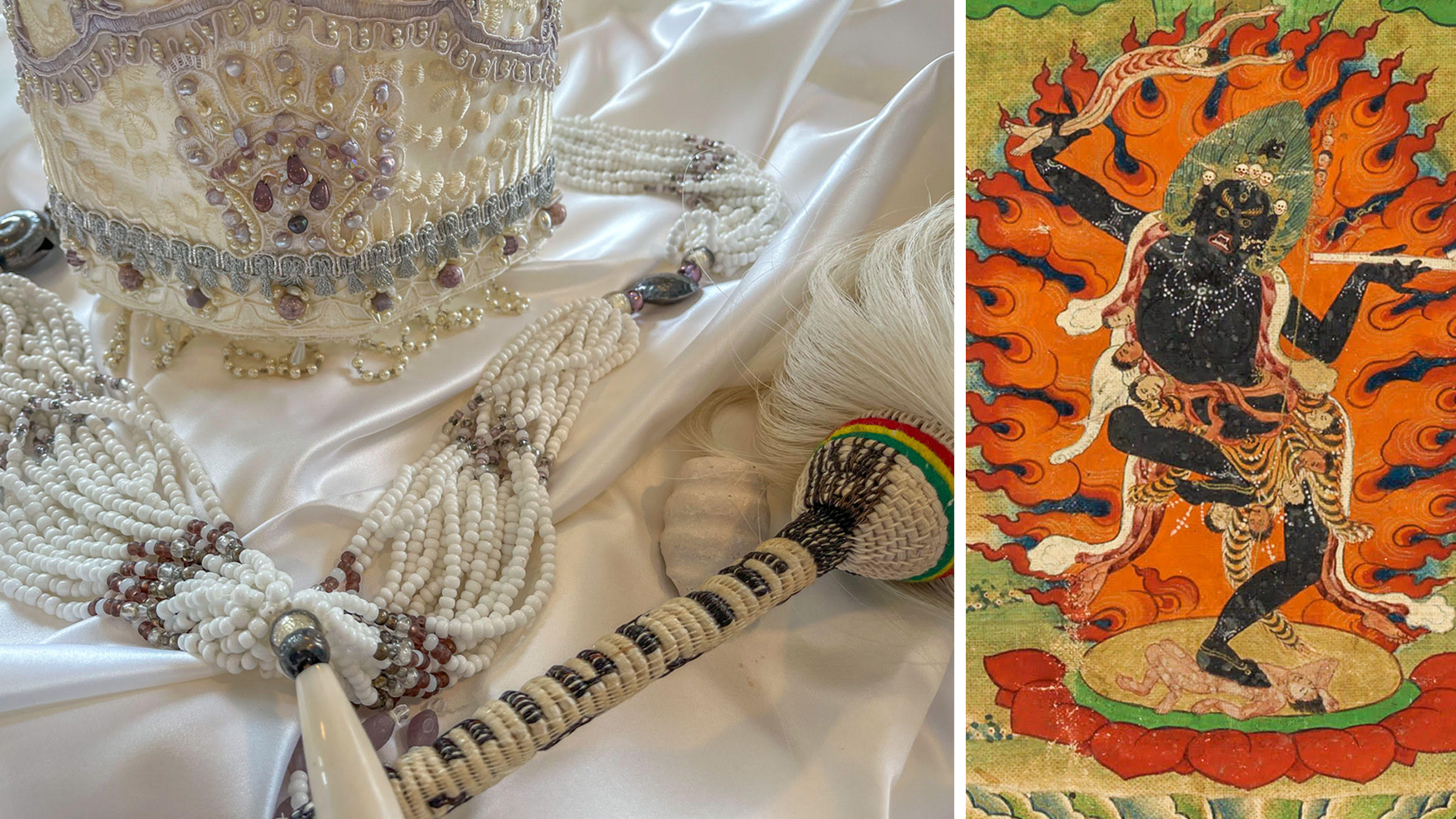Wisdom beings help us reconnect with our innate dignity, wisdom, and freedom. We engage these enlightened energies—or they engage us—when we’re ready to be challenged and supported in our commitment to realize the fullness of our gifts, the goodness of this world, and the ultimate nature of reality.
Becoming aware of a broader scope of how enlightenment can manifest is valuable, because we sometimes have too few models for dignity, freedom, and true liberation. Many in nondominant communities, such as BIPOC folks, may have become estranged from our innate goodness due to long-term, generational oppression. This disconnection, knotting, or tearing down can happen in our communities, in the dominant culture(s), and from within our own minds through internalized oppression.
Nearly three decades of training in African-based and Tibetan Buddhist practices has radically expanded my understanding of how enlightenment manifests across different traditions. My primary lineages, Yoruba/Lucumí (West African-based) and Vajrayana/Nyingma (Tibetan Buddhist) both have beings of wisdom and compassion—what we may call “deities”—that demonstrate love, kindness, fierceness, and skill. There are many such beings across wisdom traditions. These enlightened beings are guides to becoming our best selves, realizing the fullness of reality, and allowing us to see what is possible.
In the Lucumí tradition, a wisdom being or deity is called an orisha. Ogun (pronounced oh-GOON) is the orisha associated with iron, metal, knives, evolution, and the capacity to cut through internal and external obstacles. In uncovering the heart of matters, Ogun supports our growth. In Vajrayana (Tantric) Buddhism, we’d say he’s a “wrathful” wisdom being; in Lucumí, we’d say he’s a “warrior.” In addition to connecting with Ogun in our own minds, we can go to places like railroad tracks to engage his obstacle-clearing energy.
Oya (oh-YA) is another orisha in the Lucumí tradition. While generally considered wrathful and a warrior, she has a range of manifestations. Think soft breezes to gale-force winds and typhoons, i.e., gentle nudges to more forceful wake-up calls that destabilize unhelpful patterns we may be inhabiting.
Obatala (oh-BAH-ta-LAH) is orisha with both male and female forms who is associated with our innate wisdom. Like Oya, s/he also has both peaceful as well as wrathful warrior manifestations. Sometimes s/he can be like a gentle, loving parent, while at other times s/he can be like an elder mentor manifesting love in a disciplinarian manner.
Not all moments call for quiet, gentle manifestations. Some moments require us to be playful in order to coax situations or ourselves out of habitual tendencies. At other times, we must act with urgency and decisiveness. Practice with Ogun is often intense and uncompromising. There are times when we may want or need a gentler mode, so we can practice with the calmer manifestations of Obatala, or with beings such as Chenrezig in Tibetan Buddhism or Sherap Chamma in the Tibetan indigenous Bon tradition.
Compassion and loving-kindness are not always outwardly “calm.” They have a robust range of manifestations. Has anyone ever grabbed you in a bear hug, and you knew they loved you with a tenderness and a ferocity that made you feel safe? This is what I’m talking about. Sometimes we are just big—big personality, big smile, big hug, loud voices, expressive, and passionate. We don’t have to repress that, but we do have to hone these expressions so they can be of greatest benefit to all.
Sometimes, we may engage wrathful or warrior wisdom beings and awaken more intense qualities in ourselves. However, when we engage such energies, we must be willing to be held accountable for our thoughts and actions. The more wrathful the wisdom energy, the more skillful and attentive we must be in order to engage with such forces in a way that’s of greatest benefit to ourselves and others. If we don’t have sufficient stability in openness and kindness, we might end up acting out or lashing out as a means of “expressing” ourselves.
We can express compassion in wilder or more adventurous ways, so long as we are abiding in bodhicitta, the heart-mind of compassion. We can train to expand our repertoire, manifesting a wider range of skillful actions depending on what each moment calls for, reminding ourselves that while loving-kindness doesn’t always have to be calm, it does have to be skillful, loving, and kind.
We must be careful not to fool ourselves into believing we can practice with fierceness, if we cannot. One of my Buddhist teachers once said, “Move as fast as you need to without losing awareness.” If we’re moving so fast that we lose awareness, we need to slow down, lest we become a danger to ourselves or others.
This is where the Buddha, dharma, and sangha (known as Lama, Yidam, and Khandro in Tantric practice) can ensure that we’re engaging with wisdom beings or symbols without fixation. We can use them to understand where we are—and where we are not—in our practice, so we can share the most beneficial manifestations of ourselves. If we’re engaging with these practices with awareness, and if we are motivated by genuine love and desire for all beings to be free, then we may be able to practice with fierceness at times. I’ve found in my own experience that the more intense manifestations of beings often calm down when I rest more fully in my own wisdom and clarity.
We train with deities in Tibetan Buddhist and Lucumí systems in different ways depending on our lineages and what yanas (“vehicles” or “view and methods”) we have the capacity and training to practice. Some deities are extremely accessible and can be practiced by anyone. Others require transmission from a teacher to practice skillfully and with integrity to the lineage and practice. This is why we practice with teachers qualified to support us in our journeys of learning and growth.
I hope that all practitioners and those who are curious and drawn to such approaches find teachers, wisdom beings, communities, and practices that expand their capacity for fierce, gentle, generous, patient, expressive, loving, and (sometimes) wild kindness, helping us uncover our innate goodness for the benefit and liberation of all.
For almost thirty years, Sheryl Petty, EdD, has practiced in the Vajrayana Buddhist and indigenous African-based traditions.

